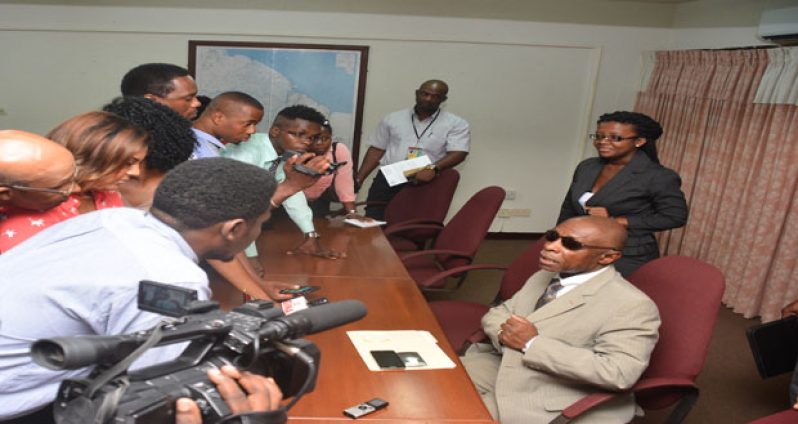THE Good Offices Process of mediating the border controversy between Guyana and Venezuela has run its course, and Guyana’s next best option is judicial decision by the International Court of Justice (ICJ).This is according to Vice-President and Foreign Affairs Minister Carl Greenidge, who explained to reporters yesterday, “At this point, we have indicated, as has been indicated by the previous Government, that the process of Good offices has run its course.” “It can’t take us anywhere constructive,” he added.
The Minister’s reasoning is that the new claim made by the Venezuelan President through Decree 1859, might not fall within the ambit of the Good Offices Process.
“As far as I’m concerned, the passage of a decree, on the basis of criteria unknown anywhere else in the world, unilaterally laying claim to maritime space, is [not] one the Good Officers Process can resolve,” Minister Greenidge said.
“That is because the determination and delineation of maritime boundaries is specifically within the competence of other UN agencies such as the Commission dealing with the Law of the Sea,” he continued.
Venezuela, however, is not a party to the United Nations Convention on the Law of the Sea, which empowers the Law of the Sea Commission referred to by the Foreign Minister.
“The feeling is that it [the Good Offices Process] has evolved, [and] it has served as a cover, not deliberately on the part of the UN of course, but it has served as a cover under which Guyana’s sovereignty has been threatened to the point where even the EEZ [Exclusive Economic Zone] has been claimed.
“Conciliation [through the Good Offices Process] has been exhausted. I don’t know what else we can do in terms of mediation, when you think about what’s been happening over the years. The only option that is left would be for a judicial resolution of this matter.”
The Foreign Minister however noted that any option for judicial resolution taken at the level of the International Court of Justice (ICJ) as prescribed under the United Nations Charter must come as a consideration from the Secretary General of the United Nations.
“The Geneva Agreement of 1966 identifies the Secretary General as having responsibility for pursuing the options of arbitration, mediation, and conciliation.” “And if one or more of these is exhausted,” Greenidge continued, “then it is he [UN Secretary General] who chooses the next option.”
Guyana, according to the Foreign Minister, has been engaged in conciliation for almost 25 years. The Good Offices Process also outlines arbitration, but Greenidge noted, “Arbitration was what we did in 1899. There was a treaty of 1897, and that treaty required the two parties to the Arbitration to agree beforehand that they would accept and implement the findings as being full, final and perfect.”
“Venezuela,” he continued, “signed such an agreement as an independent country, and today therefore, the option of arbitration can no longer be there.” When Guyana gained independence from the British Government in 1966, Venezuela had sought to reopen its claim to Guyana’s Essequibo region, alleging that the 1899 Arbitral Award, which established the border between Guyana and Venezuela, was invalid.
“I believe there has to be a consensus,” Vice-President Greenidge said, when asked about the Good Offices Process, “The UN Secretary General will invite the parties to name one or two officers, and [the parties will] accept one that is named, and therefore that has to be done by way of consensus.”
As regards judicial action, Greenidge noted the Secretary General may opt for judicial action, but such action would depend on consensus from both parties, and the question placed to the judicial body by the Secretary General.
Guyana continues to make its case to the international community against acts of aggression by Venezuela under President Nicolas Maduro’s decree, which lays claim to Guyana’s Essequibo region, as well as the maritime space off Guyana’s entire Atlantic Coast.
The CARICOM Heads of Government are expected to receive a report from the Foreign Affairs Ministry, according to Minister Greenidge, documenting Venezuela’s new decree. Meanwhile, President Nicolas Maduro has recalled Venezuelan Ambassador to Guyana, Reina Arratia Diaz, for consultations.
By Derwayne Wills




.png)









